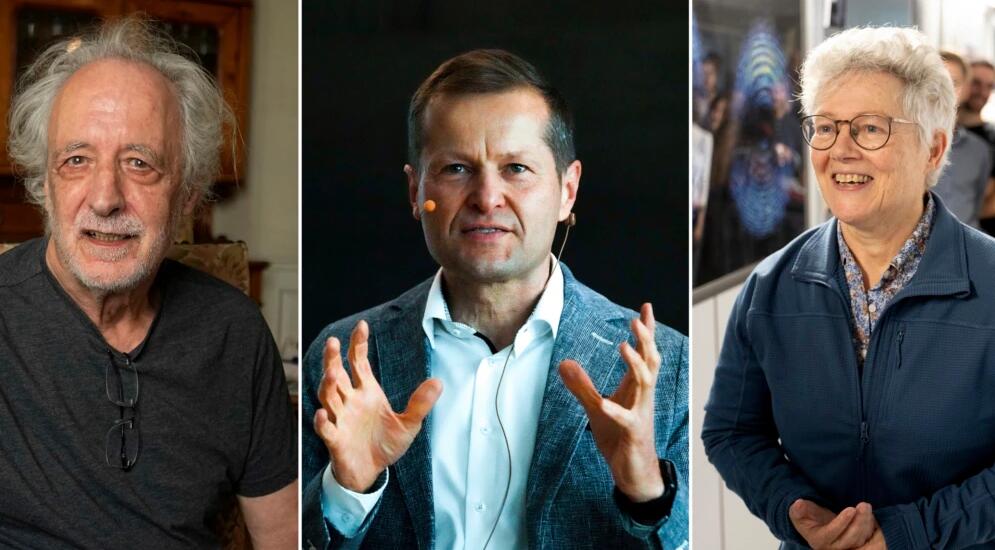提供每天更新VOA慢速英语,同时进行了翻译和讲解,具体包括VOA慢速英语听力(VOA special english)下载、中英字幕、中文翻译、长难句讲解等,同时可以进行听写训练。
三位科学家同获诺贝尔物理学奖
Three European physics professors won the Nobel Prize on Tuesday for their work on a system that permits scientists to study electrons.
周二,三位欧洲物理学教授获得了诺贝尔奖,以表彰他们在一种允许科学家研究电子的系统上所做的工作。
Electrons are one of the three particles that make up atoms.
电子是构成原子的三种粒子之一。
They are so small, however, and move so fast, that scientists had never been able to observe them.
然而,它们是如此之小,移动速度如此之快,以至于科学家从未能够观察到它们。
However, the work of French-Swedish physicist Anne L'Huillier, French physicist Pierre Agostini and Hungarian-born physicist Ferenc Krausz solved that problem.
然而,法国瑞典裔物理学家安妮·吕利耶、法国物理学家皮埃尔·阿戈斯蒂尼和匈牙利出生的物理学家费伦茨·克劳斯的工作解决了这个问题。
The professors carried out research that showed how ultra-fast light could permit scientists to "see" an electron for the first time.
这三位教授进行的研究首次展示了超快光是如何让科学家“看到”电子的。
"You can see whether it's on one side of a molecule or on the other," L'Huillier, 65, said. "It's still very blurry."
65岁的吕利耶说:“你可以看到它是在分子的一侧还是另一侧,还是非常模糊。”
The system that came from their work creates light that shows the fast-moving electron in its orbit around the nucleus.
他们研制的系统所产生的光显示出原子核周围轨道上快速移动的电子。
Krausz's team first created the short light pulses in the early 2000s.
克劳斯的团队在21世纪初首次创造了短光脉冲。
He said the system is similar to a camera with a fast shutter speed that permits a photographer to capture a Formula One race car as it crosses the finish line.
他说,该系统类似于快门速度很快、可以让摄影师捕捉到一级方程式赛车冲过终点线的画面的相机。
Using a special camera with light to see a clear image of a hummingbird's fast wing movements is another example.
另一个例子是使用特殊的光学相机来查看蜂鸟快速扇动翅膀的清晰图像。
But the speed of an electron is so fast that it could not be captured before the scientists produced experiments that showed it was possible to create a flash of light in one quintillionth of a second.
但电子的速度是如此之快,以至于在科学家进行实验之前无法捕捉到它,实验表明,有可能在十亿分之一秒内产生一道闪光。
Mats Larsson of the Nobel Committee said the electrons are the "workforce" of the atom.
诺贝尔委员会成员马茨·拉尔森说,电子是原子的“劳动力”。
"Once you can control and understand electrons, you have taken a very big step forward."
“一旦你能够控制和理解电子,你就向前迈出了非常大的一步。”
The method to study electrons should help scientists develop better electronic devices or study molecules for medical purposes.
研究电子的方法应该有助于科学家开发更好的电子设备或研究用于医疗目的的分子。
L'Huillier is the fifth woman to receive the physics Nobel.
吕利耶是第五位获得诺贝尔物理学奖的女性。
She said her work is important because electrons are "how the atoms bind together," and where the chemical reactions happen.
她说,她的研究很重要,因为电子是“原子相互连接的方式”,也是化学反应发生的地方。
She said she spent 30 years working on the project, and she wants other scientists to keep working on "fundamental science" no matter how it might be used in the future.
她说,她在这个项目上花了30年的时间,她希望其他科学家继续研究“基础科学”,无论它在未来可能会被如何使用。
It did not become clear how her work would be used in "the real world" until many years passed.
直到许多年过去了,人们才清楚她的研究成果将如何应用于“现实世界”。
L'Huillier was in the middle of teaching a class at Lund University in Sweden when she got the news.
吕利耶得知这一消息时正在瑞典隆德大学授课。
"It's incredible," she said.
她说:“这太不可思议了”。
She went back to teaching the class after being told of the prize.
得知获奖的消息后,她又回去教课了。
Agostini is a retired professor at The Ohio State University.
阿戈斯蒂尼是俄亥俄州立大学的退休教授。
Krausz is a professor at the Max Planck Institute in Germany.
克劳斯是德国马克斯·普朗克研究所的教授。
"I did not expect it," Krausz said.
克劳斯说:“我没料到会获奖。”
"I am overwhelmed," he added, asking if he was "in reality or it's just a long dream."
“我不知所措,”他补充道,问自己是“在现实中,还是只是一个漫长的梦”。
Agostini was in Paris when the news was announced but did not get a call from the Nobel Committee.
消息公布时,阿戈斯蒂尼正在巴黎,但没有接到诺贝尔委员会的电话。
He suggested the Nobel group was looking for him Columbus, Ohio, where Ohio State is located.
他表示诺贝尔委员会当时正在俄亥俄州立大学所在地俄亥俄州哥伦布市寻找他。
The 82-year-old said the prize was "good, but a bit late for me."
这位82岁的老人说,这个奖“很好,但对我来说有点晚了。”
L'Huillier experimented with how a laser affects atoms in a gas causing electrons to produce light.
吕利耶试验了激光如何影响气体中的原子,使电子产生光。
Krausz worked on creating a system that could detect a single, very fast light pulse.
克劳斯致力于创建一种可以探测到极快的单光子光脉冲的系统。
Agostini was able to investigate a series of very fast pulses.
阿戈斯蒂尼能够研究一系列非常快的脉冲。
All the experiments showed that it would be possible one day to observe an image captured in an extremely small fraction of a second, known as an attosecond.
所有的实验都表明,总有一天,我们有可能捕捉到电子在几分之一秒(即阿秒)内的运动图像。
Physics is the second Nobel Prize of the week.
物理学奖是本周公布的第二个诺贝尔奖。
Two scientists earned the medicine prize on Monday for their work on mRNA that led to COVID-19 vaccines.
周一,两名科学家因研究信使核糖核酸而获得了医学奖,他们的研究成果帮助研制了新冠疫苗。
Chemistry, literature, peace and economics come next.
化学奖、文学奖、和平奖和经济学奖随后公布。
I'm Dan Friedell.
丹·弗里德尔为您播报。

|
|